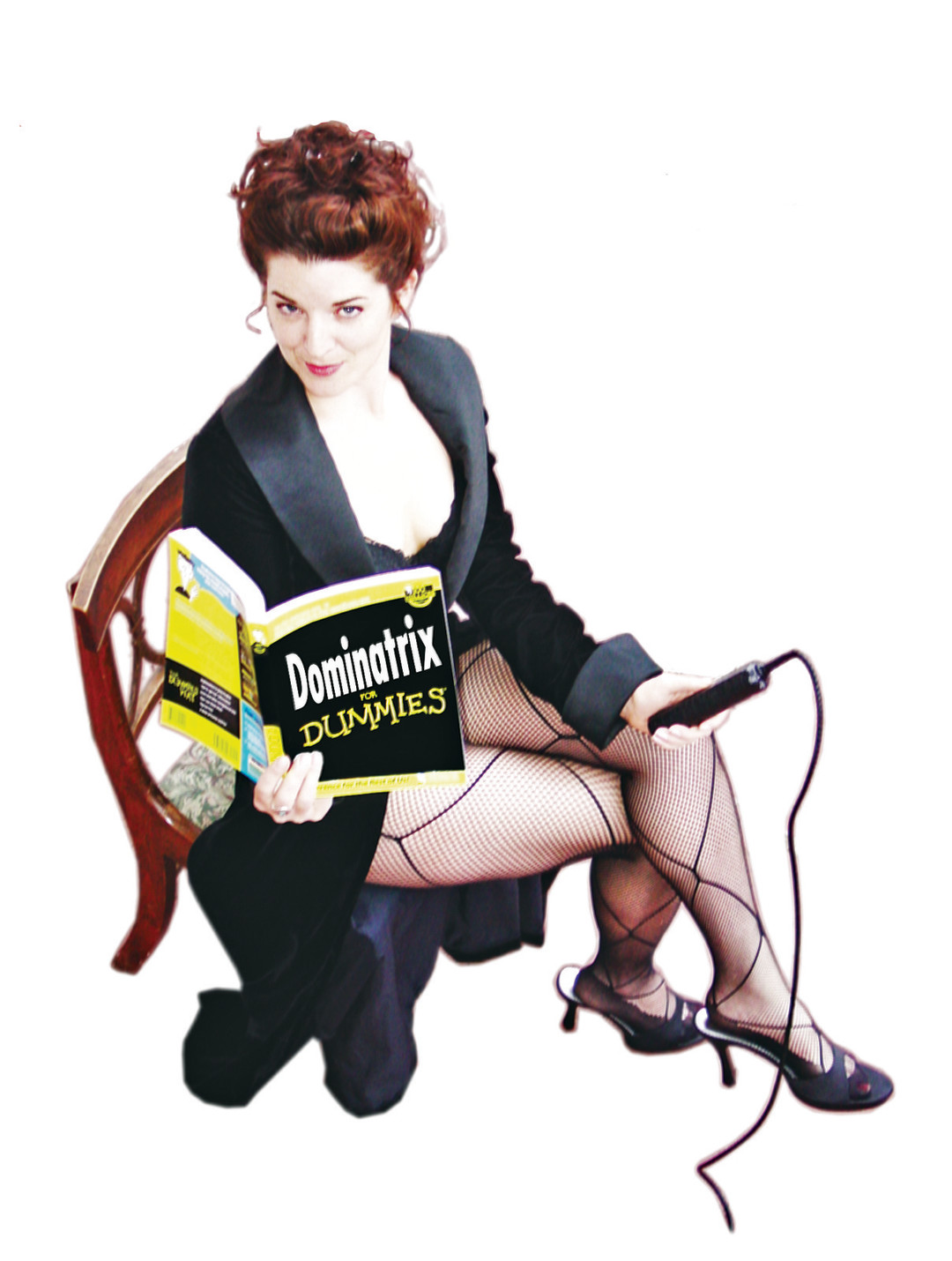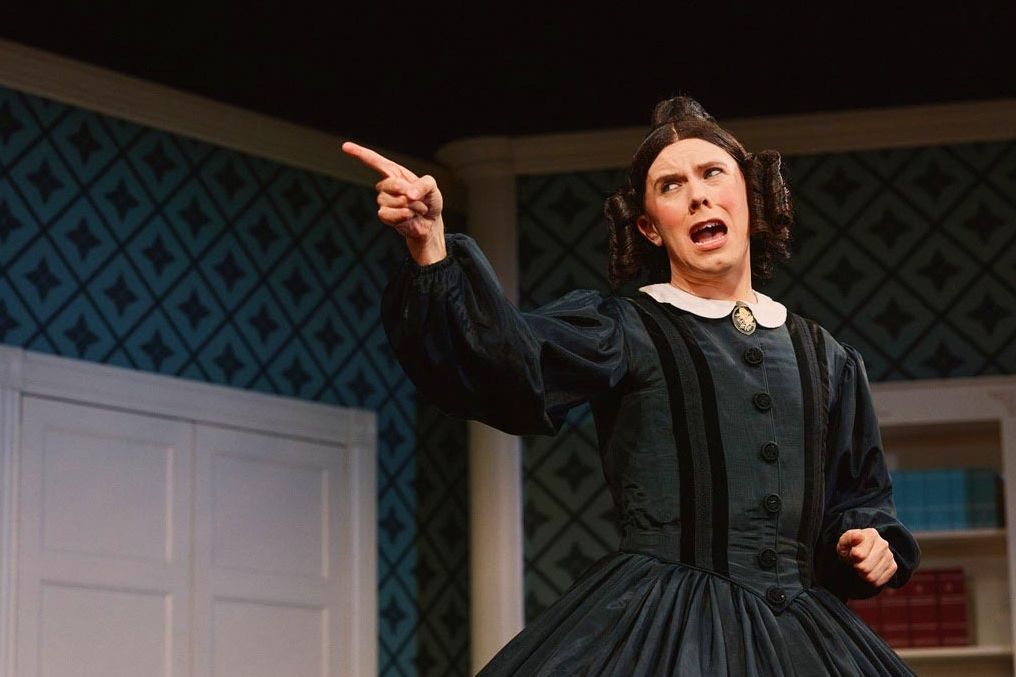Q&A: Eleanor O'Brien's 'Dominatrix For Dummies'

Image: Courtesy Eleanor O'Brien
CoHo Productions kicks off its Solo Summer Festival this weekend, a series of one-woman shows mostly written by the actresses themselves. Local performer and writer Eleanor O'Brien from Dance Naked Productions gets things started with a bang, in Good Girls Guide: Dominatrix For Dummies, which was inspired by her experiences as a professional dominatrix in New York City. O'Brien is quick to point out that beneath the surface of this tale of tawdry titilation, lies the potential for spiritual and emotional growth. A likely story!
Culturephile: Were you actually looking for a job when you became a dominatrix or was it always meant to be creative fodder for a performance?
Eleanor: I tend to be the kind of person that throws themself into something just to have an adventure. I saw the ad on Craigslist and I answered it, so it was employment, which was partially what I was seeking. But I was also invited into being a dominant by a guy I was dating, and I was uncertain, and didn’t think I was any good at it. And when I’m not good at something it’s frustrating, which was part of the impulse to answer the ad. So, I figured “I’ll go and learn how!” The ad said that they would provide training and that you didn’t need experience. To my way of thinking it would be like “Whips 101” and “Yokes for Yokels,” which of course did not happen. And I never intended to turn the experience into a show. I was taking a class at the People’s Improv Theater in creating a solo show and I was working on one about a woman who talks to God through a cockroach. And everyone was polite and encouraging. One week I forgot to do my homework so I ended up talking about the dominatrix job just off the cuff, and everyone was totally enthusiastic about it and said, “Oh, you should do that as a show!”
And the next thing you know, you’ve got a hit on your hands!
Actually no, it didn’t seem to me to be enough to just tell a story about training to be a dominatrix in New York City. I’ve been doing theater for a long time. And what kind of turned me off about it, and caused me to stop auditioning for stuff was my feeling that if it’s not about something deeper, then it’s not going to matter that much to me. Entertainment is one thing, but if it’s not something that stays with you, then, “Meh, might as well go to the movies.” I wanted there to be something more that I was offering to an audience than just a funny story. So that story is entwined with another story about how I loved to dance as a kid, but it got squashed out of me with ballet classes, and the junior high dance where you’re actually ashamed about dancing, and going to clubs in New York and having to wear uncomfortable shoes where it’s all about just looking good. Then I discovered ecstatic dance. And for me it’s become the practice of learning to stop judging yourself and start loving yourself. And I wanted to tie the two stories together.
How did you get that theme to mesh with your dominatrix job?
It came from my interest in finding out why people came to this dungeon I worked at. To literally be shit on! So how do I incorporate that with my belief that we’re all worthy and lovable? It’s kind of the sacred and the profane.
So it’s your opinion that one’s sexual peccadilloes and preferences is largely unexplored territory in theater and that it’s ripe for the picking?
Uh, yes. (Laughs). I love to make theater about sex. It’s totally become the mission of my theater company, Dance Naked Productions. Really, what it came out of was feeling like the topic of desire is largely underrepresented in theater. When it was represented, the person was shamed, punished, or laughed at. Rarely did I see any examples of desire that were celebrated. If we’re holding a mirror up to nature and exploring the breadth of human experience, where is desire in all that?
How did you get started?Dominatrix For Dummies
CoHo Theater
Thu–Sun at 7:30
My theater group’s first ensemble production was called Inviting Desire: A Theatrical Aphrodisiac. And the impetus for that was My Secret Garden—I don’t know if you know that book, but it came out in the 70s and it was a book I often stole from my mother’s bookshelf, and it’s full of women’s sexual fantasies. I’d been using it for years as masturbation material, and it occurred to me that it would work as monologues. What ended up happening is that the ensemble I cast wanted to write their own fantasies and that felt very successful to me. And so I discovered there is a real connection between eroticism and creativity that’s untapped because there’s that feeling of sex is private and it’s something you share with a lover and not with the rest of the world. I think it’s very fertile. There’s all this compost of thoughts and feelings and ideas about sex that people really want to share. And it makes it safe to talk about it on stage.
And the audience reaction is generally positive?
People love the show! They see it over and over and bring their friends because they understand that it’s a positive thing, and that the message of the show is that you are deeply worthy and acceptable just the way you are. Whatever your kinks are, you’re allowed to be imperfect and broken and still be lovable and desirable. I think it’s a message that resonates with people. I don’t think I’m breaking any new ground with what I’m saying, but it’s a needed reminder in a world where you get the message that there’s a lot of things you need to fix about yourself, from teeth whitening to a bikini wax. For me, the opposite message, that you don’t need to do anything, is a powerful one.
There’s audience participation in the show. Where does that take you?
Audience participation is pretty anonymous. I’ve learned to ease up on it because I’ve encountered people who really don’t want to do it. But I like to scare myself, so there’s a part of the show that I purposely keep improvised, and it’s when I talk to the audience. They don’t know what’s going to happen and I don’t know what’s going to happen. I think it’s important to keep that element in theater. It’s what makes theater different than TV or movies, because they’re never going to acknowledge your existence. It’s like Tracy Letts said in his Tony acceptance speech, that we’re talking directly to people’s faces and that gives us a certain responsibility. And that’s what makes it special. We’re all together here, breathing the same air, and your participation—even if it’s just your attention—can change the quality of the show. I find that really exciting.
Would you recommend Dominatrix For Dummies for, well, everyone, as a means of unlocking creativity or just getting a fresh perspective?
No, not everybody. There are some pretty raunchy sections, I’m not going to lie. For people who are really squeamish about frank discussions of sexuality, I wouldn’t want them to come to my show. I would feel bad for them, like I was torturing them.
Wait, isn’t that the point?
(Laughs) No, and that’s why I was a failure as a dominatrix. I’m a loving dominatrix—I don’t want to punish anyone. I want to love them and help them to feel loved. That’s what I realized on my journey to being a dominatrix—that I couldn’t do it the way it was supposed to be done. I don’t want to hurt or humiliate anyone. It’s just not what I’m about. I just want people to see their own inner beauty and to have the strength to fight their own demons. But that process takes discipline. Or maybe a coach.




